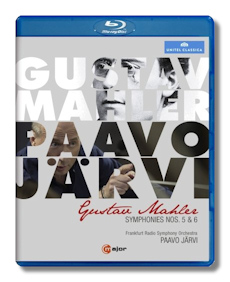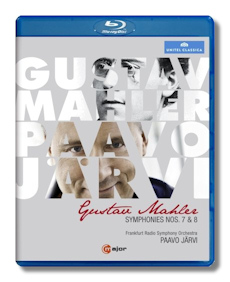
The Internet's Premier Classical Music Source
Related Links
- Mahler Reviews
- Latest Reviews
- More Reviews
-
By Composer
-
Collections
DVD & Blu-ray
Books
Concert Reviews
Articles/Interviews
Software
Audio
Search Amazon
Recommended Links
Site News
 Blu-ray Review
Blu-ray Review
Gustav Mahler

- Symphony #5
- Symphony #6
Frankfurt Radio Symphony Orchestra/Paavo Järvi
Recorded Live at the Kloster Eberbach, Eltville am Rhein, Germany - June 25 & 26, 2011 (Symphony #5); June 29 & 30, 2013 (Symphony #6)
Bonus Feature - Paavo's Mahler, Introduction to Symphonies 5 & 6
Unitel Classica/C Major Blu-ray 729404 2:38:49; 11:07 & 9:25 (Bonus tracks) PCM Stereo DTS-HD Master Audio
Also available on DVD 729308:
Amazon
- UK
- Germany
- Canada
- France
- Japan
- ArkivMusic
- CD Universe
- JPC


- Symphony #7 in E Minor
- Symphony #8 in E Flat Major "Symphony of a Thousand" *
- Erin Wall, soprano (Magna peccatrix)
- Ailish Tynan, soprano (Una poenitentium)
- Anna Lucia Richter, soprano (Mater gloriosa)
- Alice Coote, mezzo-soprano (Mulier samaritana)
- Charlotte Hellekant, mezzo-soprano (Maria aegyptiaca)
- Nikolai Schukoff, tenor (Doctor marianus)
- Michael Nagy, baritone (Pater ecstaticus)
- Ain Anger, bass (Pater profundus)
* Limburger Domsingknaben
* Europa Chor Akademie
* Czech Philharmonic Choir Brno
Frankfurt Radio Symphony Orchestra/Paavo Järvi
Recorded live at Friedrich-von-Thiersch-Saal Kurhaus, Wiesbadan, Germany - August 12, 2011 (No. 7); Alte Oper Frankfurt - May 24 & 25, 2013 (Symphony #8)
Bonus Feature - Paavo's Mahler, Introduction to Symphonies 7 & 8
Unitel Classica/C Major Blu-ray 729604 2:43:37; 7:12 & 11:15 (Bonus tracks) PCM Stereo DTS-HD Master Audio
Also available on DVD 729508: Amazon - UK - Germany - Canada - France - Japan - ArkivMusic - CD Universe - JPC
I covered the first two volumes in this complete cycle of Mahler symphonies by Paavo Järvi and the Frankfurt RSO earlier this year (Unitel Classica/C Major Blu-ray 718104 & 718204), finding the performances on them – Symphonies 1-4 – excellent. In that notice I saw Järvi's style in general as "energetic, spirited and colorful, rarely sounding ponderous or bogged down." For the most part that same summation can be made about these performances. I also made comments about the unusual aspects of the visual and sonic portion of the performances, and many of those judgments hold true here as well. More on that later, but first the performances.
The trumpet opens the Fifth playing the motto (really a motif taken from Beethoven's Fifth) emphatically and crisply. Järvi sensitively inflects the Funeral March with pacing and dynamics that truly capture feelings of sadness and tragedy without being overly ponderous or falling into the trap of manipulating the tempo as if it is taffy to be pulled about. The whole movement works well and is played splendidly by the Frankfurt RSO. In the second movement Järvi certainly makes the music stormy and vehement as the markings call for, but he also draws out angst and even desperation from the quieter moments. The passage with the big brass proclamations near the end is fraught with both struggle and triumph, a sense that this moment of epiphany is hard-won.
Mahler's very complex and lengthy Scherzo unfolds with clarity and precision, the Ländler character emerging colorfully and the contrasting moments of darkness sounding more emotionally bereft than chilling, which works fine. The solo French horn player, Samuel Seidenberg, turns in excellent work, standing out in front of the orchestra for this movement, much like a soloist. The famous Adagietto is taken somewhat slowly (two minutes slower than the recent admittedly fleet Chailly on Accentus Music), but Järvi still imparts plenty of passion and feeling. The Rondo finale brims with joy and triumph, Järvi phrasing the music with much subtlety and nuance and drawing splendid playing from the orchestra. Indeed, throughout the symphony the Frankfurt RSO consistently plays with utter commitment and accuracy.
Järvi opens the Sixth choosing a faster than usual tempo for the March theme, a decision I have always found wise and easily workable, despite the fact that it may go against the composer's intentions. The Alma theme is quite spirited in this performance, seeming to portray Mahler's wife as not only youthful but sort of a frolicsome woman. Järvi takes the development section at a very lively pace, with much often hidden detail emerging but with the music remaining a bit less threatening and less militaristic than usual. The cowbells don't sound very authentic, not exactly a deal breaker though. Overall the movement is imaginatively phrased and very well played. The Scherzo is spirited, but with tempos on the leisurely side and the playing once again nuanced, detail-rich, and quite precise. Obviously, the orchestra is very well rehearsed, though its playing never sounds stiff or calculated.
In the lovely third movement Järvi imparts a sense of serenity for the most part but doesn't overlook Mahler's seemingly ever-present hints of darkness. His pacing again tends slightly toward the slower side, but nothing ever drags here and the music flows beautifully. The passionate outpourings near the end come on with plenty of power and feeling, deftly auguring the tragedy to follow. The finale opens with ominous power and the tuba solos that follow sound chilling, the reverberant acoustics adding to the dark atmosphere. Järvi's pacing here is a bit on the brisk side, and to good effect as the feelings of desperation and ultimate tragedy come across powerfully, the strings often slashing away as the brass try to remain stately, for a while at least. The hammer blows are quite powerful here and Järvi uses two, as specified by the superstitious Mahler, who originally had three in the score but determined the third symbolized his death and thus decided to remove it. Järvi draws utterly exciting playing here from the orchestra and just about the most artistic yield from Mahler's music imaginable. This is a thrilling performance of the finale, powerfully crowning this splendid Sixth by Järvi and the fine Frankfurt RSO.
The performances of the both the Seventh and Eighth are similarly compelling and rather than rehash characteristics within each performance I'll try to generalize comments, and sort of cut to the chase. For years the Seventh Symphony was regarded as kind of the black sheep of the Mahler symphonies. Even now, some still regard it as a tough nut to crack. Järvi and the Frankfurt RSO clarify things somewhat, with great attention to detail, judicious tempos, and committed playing. In the end, this must be assessed a very good, very gripping performance. But the Eighth is probably the better of the two: the soloists, particularly sopranos Erin Wall and Anna Lucia Richter (brief though her contribution is) and tenor Nikolai Schukoff, are simply excellent. The various choirs sing beautifully and with clarity, and once again, the Frankfurt RSO plays brilliantly for Järvi, who draws out all the drama and religious fervor necessary to bring off this colossal work effectively. What is quite surprising to me is that in the bonus track dealing with the Eighth Järvi admits that "it has never been my favorite music." And he goes on to convey what struck me as tepid feelings about the work. Well, listening to this beautiful, thrilling performance, you would think he is totally convinced by this symphony. Wonders never cease.
By the way, in the album booklet the recording location for the Symphony #8 is given as the Kloster Eberbach, but that is clearly wrong. Fortunately the correct location – the Alte Oper Frankfurt – is given in the credits. My comments in the earlier review pertaining to picture quality and sound reproduction in Symphonies 2, 3, & 4 mostly apply here: the picture quality again features somewhat faded colors and less sharpness than is typical in good Blu-ray recordings, and the sound reproduction is somewhat less vivid as well. Still, despite these deficiencies, the video and sound qualities are certainly sufficient to enjoy these excellent performances. I've reviewed some other videos of all these symphonies including the aforementioned Chailly Fifth (Accentus Blu-ray ACC10284) and Sixth (Accentus Blu-ray ACC10268), the Abbado Seventh on Euroarts (EuroArts DVD 2054628), and the Chailly Eighth (Accentus Blu-ray ACC10222). In my view, Chailly is the strongest alternative in the video realm: he has better video and sound quality and has turned out consistently excellent performances in his ongoing cycle. That said, from a purely musical point of view, Järvi is arguably just as compelling in his own way.
Copyright © 2015, Robert Cummings





















